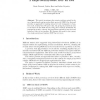Free Online Productivity Tools
i2Speak
i2Symbol
i2OCR
iTex2Img
iWeb2Print
iWeb2Shot
i2Type
iPdf2Split
iPdf2Merge
i2Bopomofo
i2Arabic
i2Style
i2Image
i2PDF
iLatex2Rtf
Sci2ools
115
click to vote
REFLECTION
2001
Springer
2001
Springer
A Simple Security-Aware MOP for Java
This article investigates the security problems raised by the use of proxy-based runtime meta-object protocols (MOPs) for Java and provides an approach for making meta-level code transparent to baselevel code, security-wise. We prove that, but giving all permissions only to the kernel of the MOP and by using Java's built-in mechanism for propagating security contexts, the permissions required by base-level and meta-level code do not interfere. We illustrate this result in the context of a simple proxy-based runtime MOP that we wrote.
Meta-level Code | Meta-level Code Transparent | Programming Languages | Proxy-based Runtime | REFLECTION 2001 |
| Added | 30 Jul 2010 |
| Updated | 30 Jul 2010 |
| Type | Conference |
| Year | 2001 |
| Where | REFLECTION |
| Authors | Denis Caromel, Fabrice Huet, Julien Vayssière |
Comments (0)

